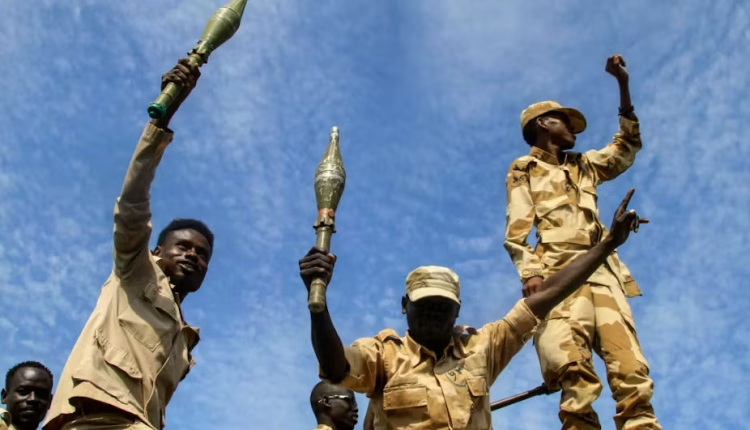The United Nations has accused foreign actors of prolonging Sudan’s internal conflict, as external powers take advantage of the crisis and drain the country’s resources, with the UAE being one of the most significant beneficiaries.
The Conversation International reported that in just one year of civil war, Sudan has emerged as the center of one of the world’s most severe humanitarian crises. Once Africa’s leading agricultural producer and a potential breadbasket for the region, the country now stands on the brink of the world’s worst famine.
According to the United Nations High Commissioner for Refugees, over 7 million people have been displaced internally, nearly 2 million have fled to neighboring countries, and 25 million, or half the population, are in desperate need of humanitarian aid. Since the conflict erupted in April 2023, it is estimated that more than 20,000 people have lost their lives.
Prospects for peace in Sudan remain bleak as the conflict rages on with no sign of resolution. Efforts to initiate peace talks have collapsed, and foreign involvement continues to fuel the violence.
Regional powers and neighboring countries have taken sides, backing either of the two rival generals at the center of the conflict: Abdel Fattah al-Burhan of the Sudanese Armed Forces (SAF) or Mohamed “Hemeti” Dagalo of the paramilitary Rapid Support Forces (RSF). The United Nations has accused both factions of committing war crimes, ethnic cleansing, and crimes against humanity.
Sudan’s proximity to major arms-trafficking hubs further complicates the situation, as weapons and ammunition are smuggled through neighboring countries like Libya, Chad, and the Central African Republic.
Countries such as the UAE and Iran are supplying weapons to the war through these countries. This violates the UN arms embargo on Sudan.
Numerous regional and international actors are invested in the outcome of the Sudanese conflict.
Egypt and Saudi Arabia back the Sudanese military, while the UAE, Libya, and Russia—through the Wagner Group—support the paramilitary Rapid Support Forces.
The UAE has emerged as the most invested foreign player in the war. It views Sudan’s resource-rich and strategic location as an opportunity to expand its influence and control in the Middle East and East Africa.
Since 2018, the UAE has invested more than $6 billion in Sudan. This includes foreign reserves in the Sudanese central bank, agricultural projects, and a port on the Red Sea.
The UAE has also recruited and funded fighters from Sudan, primarily from the Rapid Support Forces, to participate in its conflict in Yemen.
Since 2019, the UAE has actively worked to undermine Sudan’s democratic transition following the removal of long-time ruler Omar al-Bashir. Abu Dhabi has bolstered the military and paramilitary forces against the civilian government. As the civil war intensified, the UAE’s focus shifted to supporting the Rapid Support Forces.
Despite repeated denials from Abu Dhabi of arming or supporting the paramilitary group or its leader, Hemedti, evidence points to the contrary, making the UAE’s covert involvement in the conflict an “open secret.”
The international spotlight on Abu Dhabi’s role has been further intensified by American rapper Macklemore’s announcement of a canceled October 2024 concert in Dubai, citing the UAE’s involvement in “genocide and ongoing humanitarian crisis.”
The UAE’s involvement in Sudan highlights a wider trend in its foreign policy over the past decade: forming alliances with local powers to pursue its geopolitical and economic objectives throughout the Middle East and East Africa.
In Sudan, the UAE has teamed up with Russia to support the Rapid Support Forces (RSF) via the Wagner Group. Wagner has been active in Sudan since 2017, primarily focusing on resource extraction projects in regions like Darfur, where Hemedti’s forces play a crucial role and are key allies in these ventures.
UN experts report that the UAE has set up logistical operations to deliver weapons to the RSF through its networks in Libya, Chad, the Central African Republic, South Sudan, and Uganda. These arms and supplies are reportedly concealed as humanitarian aid.
What is the benefit to the UAE?
The UAE’s interactions and alliances with the RSF illustrate the intricate and opaque nature of Sudan’s recent geopolitical shifts. Hemedti is said to safeguard UAE interests in Sudan, which involve access to gold and agricultural products.
Gold, a significant driver of conflict in Sudan, fuels the war efforts of both sides. The UAE benefits primarily from this trade, receiving nearly all of Sudan’s smuggled gold and serving as a key hub for laundering this gold into the global market.
Recent data reveals that in 2022, the UAE imported precious metals from Sudan valued at approximately US$2.3 billion.
The UAE relies on imports for 90% of its food supply. Since the global food crisis of 2007, the country has prioritized food security, leading to significant investments in overseas agricultural ventures.
In northern Sudan, two Emirati firms are cultivating over 50,000 hectares, with plans for further expansion. These agricultural products are exported via the Red Sea. To bypass Port Sudan, which was formerly managed by the Sudanese government, the UAE finalized an agreement in 2022 to develop a new port along the Sudanese coast, to be operated by Abu Dhabi Ports Group.
The UAE has leveraged the RSF to advance its interests and ambitions related to food security.
While the humanitarian crisis in Sudan worsens, the international response has been insufficient. The global community has failed to provide adequate aid or exert pressure on the UAE. The UN Security Council has not addressed the serious allegations from its Panel of Experts on Sudan concerning Abu Dhabi’s involvement.
Human Rights Watch has accused the RSF of genocide, crimes against humanity, and ethnic cleansing amid the ongoing conflict. Yet, there are no current measures to hold the UAE accountable for its partnership with the paramilitary group. The UAE continues to benefit from its alliances with Western nations.
If the international community does not act to prevent foreign entities from exacerbating the conflict, Sudan risks descending into a severe humanitarian disaster with lasting global repercussions.



